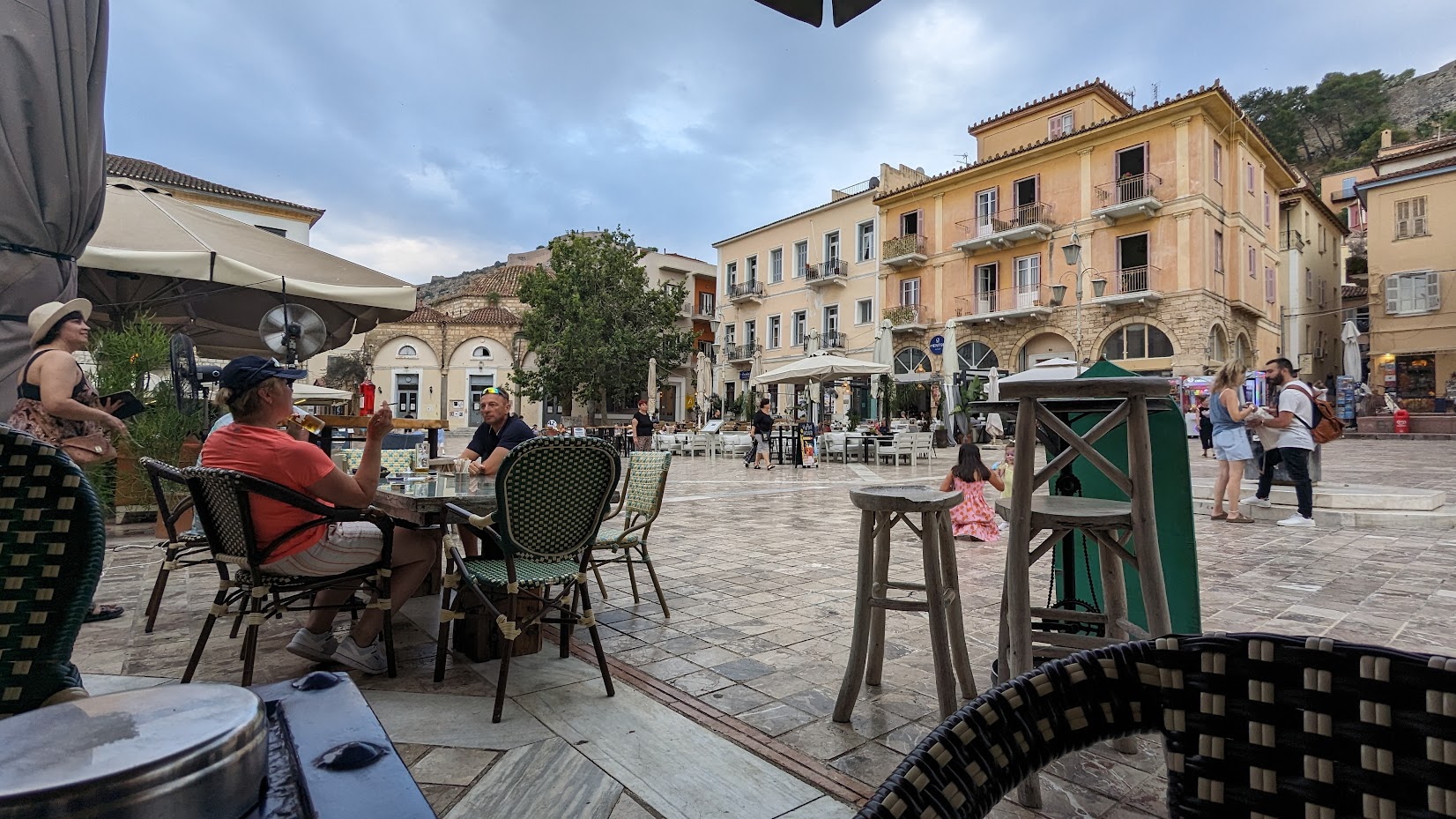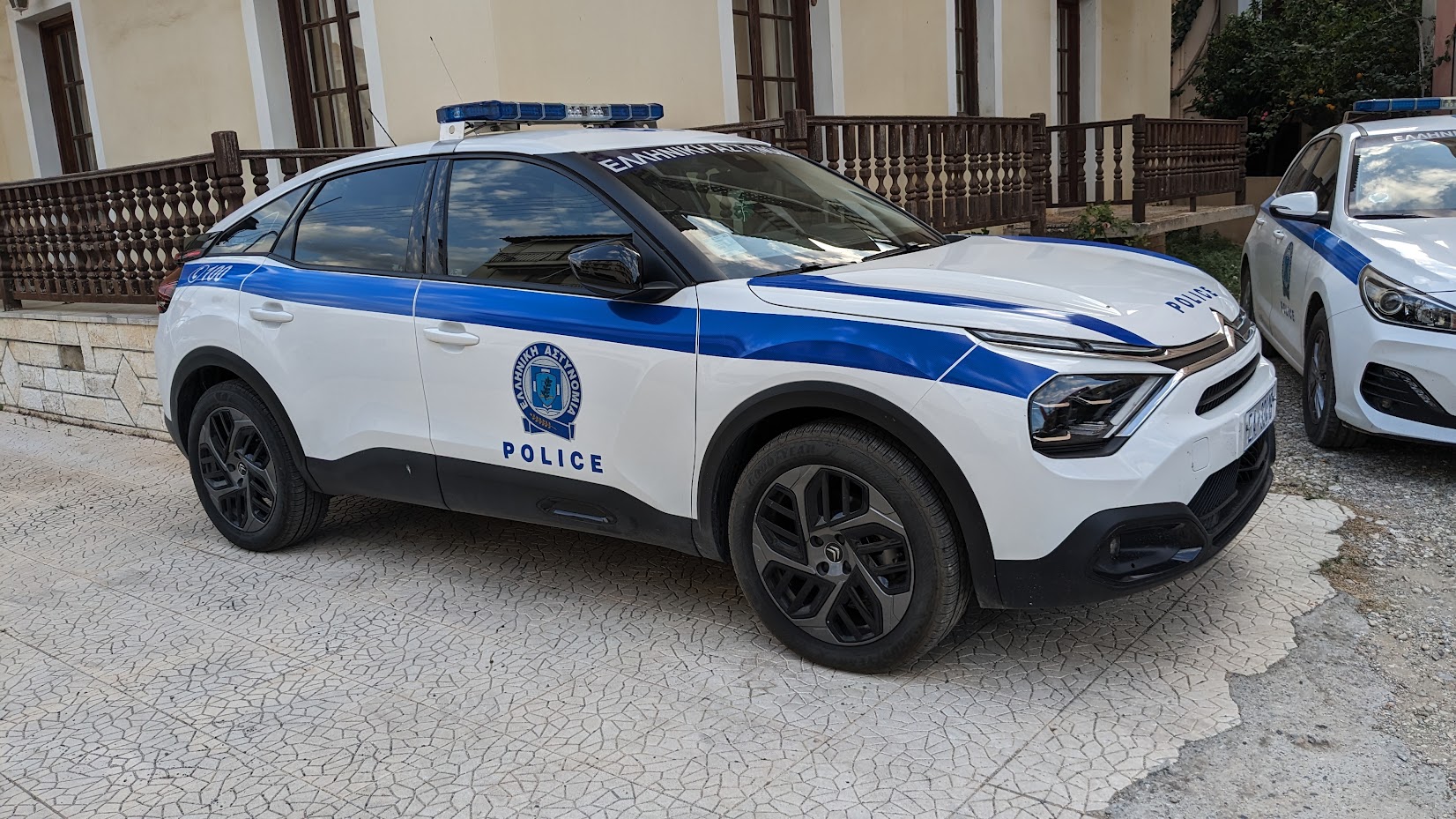
Dispatches from Greece: The roads, and drivers, are a little terrifying
July 12, 2023
By
Todd Humber

The platia – or town square – in Nafplio, Greece. Photo: Todd Humber
“You have to be brave.”
That was the advice dispensed by my partner’s cousin Antonis this week — in between bites of tzatziki-drenched souvlaki at the cantina in our local platia (aka town square) — about driving in the heart of Athens.
For the last couple of weeks, we’ve been on a working holiday in Greece, spending time at the in-laws’ house seaside in the Peloponnese region. That also means I’ve spent a fair bit of time piloting our rented white Peugeot 208 through towns like Astros, Argos, Tripoli, and Nafplio.
We took the car up into the mountains to the quaint village of Karyes, shifting the manual transmission up and down repeatedly as we navigated roads that varied from world-class to extremely suspect in both design and maintenance.
Suspect, at least, through the eyes of a Canadian driver used to wide lanes, sane inclines, and relatively smooth pavement. The driving in rural regions of Greece is fairly simple and uncongested.
The behavior of locals on the roadways, though, can seem bizarre and downright unsafe to a Canuck. It had the OHS Canada editor in me thinking about how difficult it can be to achieve real change in an unsafe culture.
Blind corners, missing guardrails and speed limit suggestions
Passing on a blind corner is par for the course here. I’ve lost count of the number of times I’ve had to swerve, out of my own lane, as an oncoming vehicle barreled around a slow-moving truck on a twisting mountain road. Solid lines and dotted lines, apparently, mean the same thing.
Guardrails are installed… inconsistently. While they are often where you would expect to see them, they’re frequently missing in areas where a misstep would translate into a 200-foot-drop off a cliff.
The posted speed limit is 50 km/h on a good chunk of the road we take nearly daily, from our village to the nearest town. Do that, though, and you’ll get run over. Even if I bomb along at 80 or 90 clicks, I will get passed by nearly every car that races up behind me.
Can’t find a parking spot? Create one — even if it blocks a live lane. We heard a story on this trip about a Canadian family who plowed into a parked car that was jutting out onto the road, resulting in serious injuries. Everyone, thankfully, will be OK.
Numbers tell the story
Hard numbers tell the story of Greece’s roadways. According to the World Health Organization’s Global Status Report on Road Safety, Greece had 10.3 deaths per 100,000 population in 2016. That’s double the average in the European Union, which reported 5.2 deaths per 100,000 population.
Germany (4.3); France (5.1); Italy (6.1); and the United Kingdom (3.1) all had remarkably lower rates of death attributed to driving. Canada’s tally is 4.7, according to data from 2021.
These unsafe driving habits seem to make Greeks shrug. Einai afto pou einai. “It is what it is.” There are rules, but they are viewed as suggestions to be followed at your convenience.
That’s exactly what an unsafe workplace looks like — employees get so used to cutting corners, either without consequences or by being rewarded for putting production over safety, that they don’t realize the behavior is so risky.
It can seem impossible to change. But we have seen it happen, time and again, in workplaces. It takes a sustained campaign of pressure, from the top down and from the bottom back up, to move the needle. Often, it takes a serious incident to spark the change. I can’t count the number of times I’ve interviewed an employer who told the tale of “that fateful day” when everything shifted following a serious injury or death.
Can it be fixed?
It got me thinking about what it would take to achieve real change on Greece’s roadways, disregarding the fact that, you know, nobody asked me. Using an OHS approach, it might look something like this:
Support from the top: Government leaders in transportation and road safety would have to make safety a core value.
Awareness and education: Greece would need to undertake a road safety blitz, targeting both drivers and pedestrians. This includes highlighting the risks of dangerous driving and promoting defensive driving techniques.
At this point, I can hear the words of Jimmy — my Greek-Canadian, father-in-law — who will regularly say: “Drive defensively. The life you save may be your own.”
Enforcement of traffic laws: I’ve seen more police in Greece on this trip than I have in all my other visits combined. But it’s not really putting a dent in the behaviour. There needs to be strict enforcement of existing laws and regulations, including penalties for reckless driving.

A police car in the town of Paralios Astros, Greece. Photo: Todd Humber
In short, drivers need to feel that — should they undertake unsafe behaviour behind the wheel — there will be consequences.
Fixing the roads: See the above note about guardrails. Put more of them up in high-risk areas, improve road signage and invest more heavily in road maintenance. Much of this may be unfair, comparing an ancient nation like Greece to a relatively modern one like Canada, but there is room to improve the infrastructure.
Urban planners and engineers should be brought on board to review areas with high collision and fatality rates to see what can be done to improve safety.
Put all that together, and you just might be able to drive towards a future where Greece’s roads are as safe as a tranquil beachside taverna, and the honking of horns is replaced with the sweet sound of tzatziki-induced contentment.
For now, I’ll take the advice of Antonis and Jimmy — driving bravely and defensively — as we pack up the bags and head to the airport.
Todd Humber is the senior editor for OHS Canada.